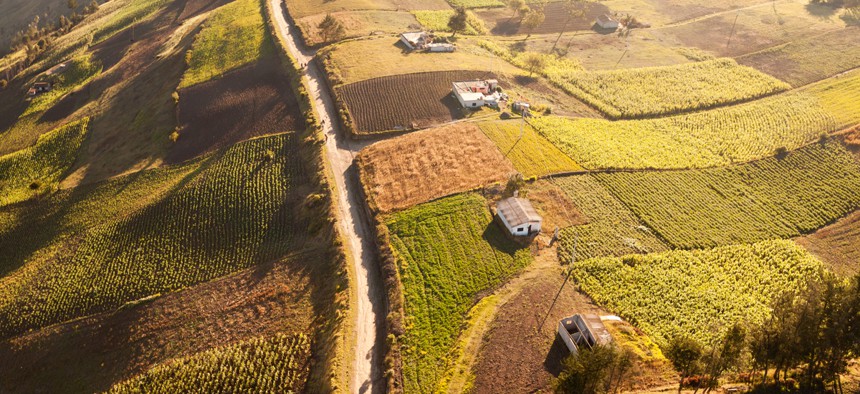Poll: Despite Struggles, Rural Americans Feel Connected to Communities

Nearly three-quarters of rural Americans rate their quality of life as good or very good, according to the survey. Shutterstock

Connecting state and local government leaders
Civic engagement is high among rural residents, which may offset negative feelings about financial insecurity and access to health care.
Most rural Americans are happy with their quality of life and optimistic about their ability to play a part in their communities, despite ongoing struggles with financial insecurity and access to health care, according to new polling from NPR, the Harvard School of Public Health and the Robert Wood Johnson Foundation.
“Rural Americans are largely civically and socially engaged, see their communities as safe, and value their quality of life. However, a smaller but considerable share struggle with financial insecurity, internet access, housing problems, and accessing affordable, quality health care,” says the report, the second in a series titled “Life in Rural America,” an ongoing grant for public opinion polling on broad health topics.
The poll, conducted from January through March, surveyed 1,400 adults residing in places that are not part of metropolitan statistical areas. The survey has a margin of error of plus or minus 3.5 percentage points.
According to the results, nearly half of respondents said they would have a problem paying in full for an unexpected $1,000 expense, the median amount of a low-income family’s “most expensive financial shock” each year. More broadly, four in 10 rural adults said they or their families had struggled to pay bills in the past few years, including medical bills or dental treatments (32 percent), rent or house payments (19 percent) and food (17 percent).
In the past year, 26 percent of rural Americans needed health care but did not receive it. For 45 percent of those respondents, money—specifically, not being able to afford the cost of care—was the main reason, followed by inconvenient office locations (23 percent), not being able to get an appointment during hours that worked (22 percent) and difficulty finding a provider who accepted their health insurance (19 percent). Those numbers underscore ongoing issues in both the health-care and insurance industries, said Robert J. Blendon, co-director of the survey.
“Even with major improvements in health insurance coverage over the last decade, it is concerning that one in four rural Americans are struggling to get the health care they need,” said Blendon, a professor of health policy and political analysis at the Harvard T.H. Chan School of Public Health, in a statement.
Telehealth—accessing health providers remotely, typically via the internet—is an option for Americans residing in remote rural locations, but the reach of that option is limited by the lack of reliable broadband in those communities. One in five survey respondents said accessing high-speed internet is a problem for their families, leading to gaps in care and an inability to “participate in the digital economy, creating a major divide between rural and urban areas,” the report says.
Despite those struggles, rural Americans feel happy and secure in their communities. Most (73 percent) rate their quality of life as good or excellent, and 98 percent said their communities were either very or somewhat safe from crime. Those outlooks may be related to the level of community involvement present in rural areas—49 percent of survey respondents had volunteered with organizations “working to make their local community a healthier place to live,” while 37 percent had attended political meetings on local affairs and 31 percent had volunteered with a religious organization. Additionally, 61 percent belong to health, social or community service groups, including hobby and craft groups, fraternities or sororities and religious groups.
And while 18 percent of rural residents say they “always or often” feel isolated or alone, 92 percent said they have at least a few people nearby they can count on for help or support.
Taken together, those results help “build a more complete understanding of the challenges to being healthy and the strengths of rural places in fostering good health,” Richard Besser, president and CEO of the Robert Wood Johnson Foundation, said in a statement. “While it’s encouraging to see neighbors looking out for each other and strong networks of social support, it’s sobering to see that rural families struggle to pay for housing or food, go without needed medical care and lack financial security and essentials like high-speed internet access.”
Kate Elizabeth Queram is a Staff Correspondent for Route Fifty and is based in Washington, D.C.

NEXT STORY: Washington, D.C. Considers Allowing Residents to Issue Parking Tickets




